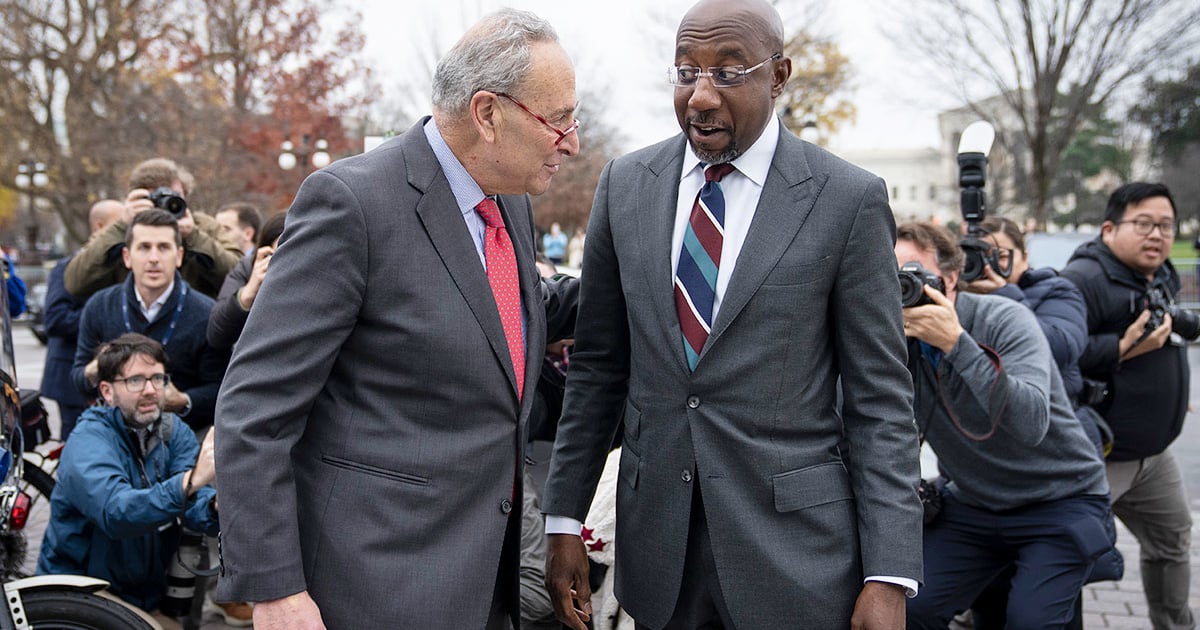
WASHINGTON — With Republicans gaining control of the House and Democrats securing a slim majority in the Senate, the shifted balance of power come January likely will mean no major overhauls of existing policy affecting the auto industry, but it could change command of deciding votes.
In a Georgia runoff election Tuesday, Democratic Sen. Raphael Warnock narrowly defeated Republican challenger Herschel Walker, expanding the Democrats’ majority next year to 51-49 in the upper chamber. In the House, Republicans will have a 221-213 majority.
The congressional shakeup could diminish the swing-vote influence of dissenting Democrats such as Sen. Joe Manchin — the West Virginia lawmaker who wielded the power of a single vote to shape major legislation in an evenly split Senate — while boosting the profile of members such as Warnock, whose state has landed multibillion-dollar investments from the electric vehicle industry.
“The Warnock victory was a huge, huge win for the Democrats,” said Mark Rom, associate professor of government and public policy at Georgetown University’s McCourt School of Public Policy. Winning Georgia, he added, is “absolutely essential” for the presidential hopes of Democrats in 2024.
“Whatever Sen. Warnock asks for in the Senate, I think that [Majority Leader] Chuck Schumer is going to say, ‘We’ll see what we can do to help you,’ ” Rom said.
An elevated influence in the next Congress could bolster Warnock’s attempt to help automakers in his state by delaying certain sourcing and manufacturing requirements in the Inflation Reduction Act’s tax credit for consumers buying new EVs.
However, any legislative changes to the credit by the end of the year would be a “really, really heavy lift,” according to Andy Buczek, government policy adviser at law firm Dykema.
“We’re likely to see that credit maintain its current status going forward, at least for the time being,” he told Automotive News. “That is probably a good example of the type of certainty, so to speak, that we are going to see on the policy front for the near term: that it’s going to be hard to make big changes to existing policy in this divided government.”
Warnock introduced the bill — known as the Affordable Electric Vehicles for America Act — in September. The legislation would create a longer phase-in for the EV tax credit’s North American final assembly requirement as well as its critical mineral and battery component provisions.
As of the Inflation Reduction Act’s enactment in mid-August, eligible EVs must be built in North America. Restrictions on sticker price, buyer income, and battery component and critical mineral sourcing take effect Jan. 1, disqualifying automakers such as Hyundai Motor Group that do not yet make EVs in the U.S.
Under Warnock’s bill, only EVs sold after Dec. 31, 2025, would have to be built in North America. Restrictions on critical mineral sourcing and the domestic manufacturing of battery components also would be delayed.
U.S. Reps. Terri Sewell of Alabama, Emanuel Cleaver of Missouri and Eric Swalwell of California — all Democrats who won midterm reelections in their states — introduced a companion bill last month.
Warnock has argued that automakers in his state need more time to meet the onshoring requirements and bring U.S. EV and battery factories online.
In a statement to Automotive News, Hyundai said it supports Warnock’s efforts and is actively engaging with the senator, other policymakers and the Biden administration regarding the credit’s North American assembly requirement.
“We strongly support solutions that provide transition relief during the period that EV and battery manufacturing plants are under construction in the United States to companies such as ours that have made binding and irrevocable commitments to build EVs here,” the automaker said, noting its $5.5 billion EV factory near Savannah, Ga., that will produce Hyundai, Genesis and Kia models and create more than 8,000 jobs by the time it opens in 2025. None of its EVs will qualify for the tax credit before then.
Meanwhile, the U.S. Treasury Department is preparing to issue proposed guidance by Dec. 31 that will further define how to meet the credit’s eligibility restrictions amid requests from automakers and U.S. allies for flexibility in the rules and equal treatment.
“It’s important for the Biden administration to send a signal to our allies that we want to work with you,” said Nick Nigro, founder of EV research group Atlas Public Policy. “At the same time, the Inflation Reduction Act was a historic achievement for domestic manufacturing, domestic investment, and it’s hard for me to see a path where those domestic priorities are undone.”
Still, even in a divided Congress, Nigro said he views EVs as an increasingly nonpolitical issue, especially as investments from the auto industry flood into states where voters predominantly favor the Republican Party.
As for Warnock’s bill, policy watchers such as Acura dealer John Connelly said it sends a signal to the administration that there is concern over the EV tax credit’s implementation.
“I don’t anticipate any of that legislation is going to be part of this lame-duck period, but it’ll definitely be a big topic of discussion going into 2023,” said Connelly, who is the 2022 chairman of the American International Automobile Dealers Association.
“Uncertainty is never a good policy,” he said, “and so hopefully we can bring some certainty to how this is all going to be implemented.”